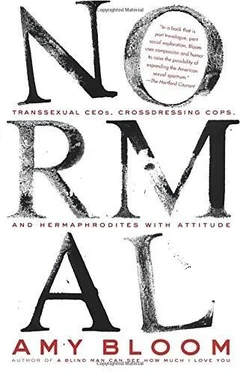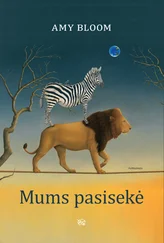The rumba people are followed by an Israeli man who plays a homemade drum with his mouth, an accountant who sings “Heartbreak Hotel” badly but arouses the crowd’s snickering only when he attempts to mime the Presley moves, and a lady in her seventies who sings “I Believe” and clutches the emcee’s hand. He begins supportively, swinging her hand gently, smiling genially, but his true nature asserts itself, and by the end of her song, he is pumping her arm, grinning and flapping like Jerry Lewis.
The next guest is one of ours. I noticed Ted the first night, a small, dapper blond man in a tux, and wondered if the Holiday had Gentlemen Escorts like the fancy ships do. Unlike the other crossdressers, he comes to dinner every night in high, black-tie drag: exquisite bouffant wigs, perfect matte makeup, three-inch heels, and formfitting dresses that cling to his padded bust and bottom. His wife looks pleasant and sensibly dressed, except for the one night when he is in a tux and she is in one of his outfits. For one night, she too looks like a beautiful drag queen, and even so, our crowd is more interested in his artistry than in her.
Ted’s performance, not surprisingly, is Marilyn Monroe doing “Diamonds Are a Girl’s Best Friend.” Ted asks the emcee for his hand, and the emcee backs away, miming horror. The audience laughs, but they’re puzzled. It is not entirely clear to them that Ted is a man — maybe the emcee pulled his hand away because she’s such a femme fatale? — but it is obvious that this is someone who has violated the Talent Night rules of homespun and shyly showcased minor talents. Ted’s is a minor talent, but his production values, from wig to beauty mark, are high — too high for this crowd. Ted flirts with the emcee during the show, but the emcee is stone-faced. I cannot tell, from beginning to end, whether the hostility in the air is a response to Ted’s semiprofessionalism, his artifice, or his maleness, but there is something ugly, as there is in the lounge later that night when Merrie sings “My Way” in a pleasant tenor. It is not abusive and not challenging, but there is a coolness, an unwillingness to engage with him as he is.
The show is over. Lori and I talk, looking out at the ocean. She says, “Most crossdressers, they dress in safe places which are just big closets. I think most crossdressers are comfortable as long as it’s a safe environment, where they can be seen but not in danger. Although a lot of them need some danger, some milestones — my first time at the mall, my first time in a restaurant.”
The evening after the talent show, Felicity comes to dinner en drab, looking like what he is, a heavyset Baptist minister who worked construction in his youth. The headwaiter approaches the table bearing a bouquet of roses. Every night he has become more and more camp and foolishly flattering; the crossdressers are big tippers, moderate drinkers, considerate of the staff, and extremely polite. I don’t doubt that they are desirable customers. With a flourish, the headwaiter delivers the roses to Felicity’s wife, to applause from our four tables. Felicity puts his big hand on hers and squeezes it. He makes a toast to their thirty years and her goodness and support. He begins to choke up; her remote look never changes. It does not please her that he decided to dress like a man for her tonight. It does not please her that he is so grateful to her for trying to believe that he crossdresses only because he cannot express his warm and nurturing self while wearing trousers. It does not please her, God knows, to sit with a bunch of men in makeup and dresses, some modest, some outrageous, some passable, most not, and call it an anniversary party. It just about kills her that this should be their life, and although she absolutely believes that Jesus will guide them, Felicity’s crossdressing is a cross to bear.
Later they come to talk to me, and when Felicity says that his path may be to minister to the transgendered, his wife puts her hand over her mouth and says, quietly, “Jesus will show us the way.” And means, unmistakably, that the way will surely not be this one, that Jesus cannot want her to be the wife of a crossdresser who ministers to the transgendered. Felicity says, “It’s like there are three of me in this little boat: the husband, the crossdresser, and the minister. I can hear the falls approaching, and I know, I know with all my heart, one of us will not survive this ride.” He begins to cry, and I get tears in my eyes. As I hand him a Kleenex, his wife glares at me and says, “You sure do get involved with your interviews.” She must think that it takes some fancy footwork to feel so sorry for the crossdresser and not for his wife, and when I look at her sympathetically, she almost spits. Pity from people like me is not what she wants either. For the remainder of the trip, Felicity seeks me out and his wife avoids me.
I do better with the wives, overall, at Fall Harvest 2000 in St. Louis, Missouri. We all arrive in the last days — not the glory days, if there ever were any, but the last, sad days — of the Henry VIII Conference Center on the frayed edge of the St. Louis airport. In two weeks this place, with its tired decor and dangling fixtures, will be razed to make a new runway. The Henry VIII has bits and pieces of Merrie Old England and bigger bits of St. Louis Generic, circa 1973. It is like a Mel Brooks set with a Spike Lee twist: doorknobs sliding in and out of splintering doors, splotched carpeting, lopsided lamps, and a sparse, disheartened staff composed of black teenagers, some of whom look too young to work, and Bosnian women who look as weary and wary as the American kids. No one is inclined to do much, and when the crossdressers come in with three and four suitcases, the kids and the women all look over sympathetically but without stirring.
The first people I meet in the cavernous lobby are my host, Marcia Lynn, and his wife, Barb. Marcia Lynn is president of the St. Louis branch of MAGGIE (Mid America Gender Group Information Exchange). Throughout the weekend he and the other regulars among the crossdressers will tell me how bad they feel for the staff, whom they’ve gotten to know during the five years the St. Louis group has been meeting here. “They love us,” Marci says. “We’re friends, a lot of us are fun people. The staff is crazy about us.” Certainly, the other guests, a swingers’ convention, do not tip as well or express solicitude for the staff.
There’s an unexpected resemblance between some of the crossdressers and the swinger wives, who show up for their morning coffee in heavy makeup, sequined tube tops, fringed miniskirts, and the occasional pair of fluffy bedroom slippers — which do distinguish them from the crossdressers, who stick to their sneakers by day and killer heels at night. By the end of the weekend, some crossdressing couples and swinging couples are sharing Rob Roys in the lounge, but for the most part, the crossdressers express perfunctory tolerance and real disdain for the swingers, who reciprocate with jovial contempt.
At the registration table there are stacks of meal tickets, pamphlets, and information about MAGGIE, the Fall Harvest’s sponsor and the umbrella organization for chapters in Chicago, Minneapolis, Milwaukee, Iowa, Kansas City, St. Louis, northern Indiana, Omaha, and Wichita. Tours of Grant’s Farm, a wildlife preserve, and of the Anheuser-Busch brewery are scheduled for Friday and Saturday. The professional service people for the crossdresser community are also here: Absolutely Picture Perfect, providing videos and formal portraits; Barb’s Large & Lovely lingerie, sizes 1X–8X; the IFGE Bookstore; Shoe Express, ladies’ shoes in sizes 11–15.
Marci runs all over the hotel, happily bustling, scolding, cajoling; he won’t have a real crisis on his hands — aside from the usual lost room keys, forgotten wigs, vendors who fail to show up — until the night of the beauty pageant, when the papered-over gap between the transsexuals and the crossdressers opens up. Barb works the registration table with her friend Carol, also the wife of a crossdresser. They look like lots of fortyish women in St. Louis: curly brown hair with a little gray at the temples, pastel-framed glasses, comfortable track suits, a little pink lipstick. They are enormously kind and helpful, and they roll their eyes affectionately at their husbands’ self-important busyness and excitement, as wives at husband-centered events often do. And in the great tradition of ladies’ auxiliaries, they have become important parts of the community, often providing not the point of the event but the web of it: they are the in-house mothers, and Marci publicly thanks Barb every day.
Читать дальше












